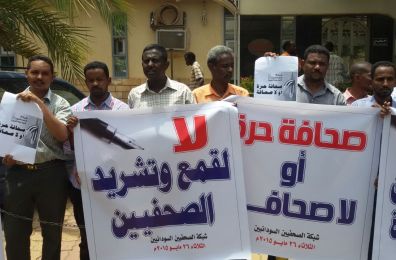Sudanese government concerned over newspapers’ handling of national security & economic issues
July 21, 2015 (KHARTOUM) – An official at the Sudanese Ministry of Information said that the extensive coverage by the press given to national security, economic and societal issues is of “great concern” to the government.

Journalists are also frequently summoned for interrogation by NISS over stories they author.
The Sudanese state minister of information Yasir Youssef who spoke on Tuesday at the first summit of East and Central Africa Journalists’ Union called for developing recommendations for the development of effective and practical solutions to the problems and challenges facing journalists in Africa and the world which he said are almost similar in nature.
He underscored the need for continued dialogue between the government and the press to reach a well-established relationship between the two parties on press freedoms.
“It is true that there is an ongoing debate between us [government and press] and we believe that we have not yet reached an optimal point, but the reality is good compared to countries of the region, and the process has evolved in recent years, until we got to this stage,” Youssef said.
He said that the press plays a complementary role to the government one which helps the state correct shortcomings.
“We welcome constructive criticism and any criticism that goes towards improving government performance,” he added.
Youssef acknowledged that what irks government the most with the press is its in-depth coverage of national security, economic and societal issues, stressing that Sudan has suffered from civil wars since its independence of which its effects are still ongoing.
He emphasized that how items related to conflicts, wars and national security are handled is a sensitive matter and that deepening dialogue on it would allow for reaching common understanding with the press.
The official praised the role of the Sudanese press in issues of peace, security and constitutional developments saying it demonstrated more maturity than political parties.
He said that press violations on national Security and societal issues are minor adding that they want to address it so that the press retains its leading role.
Youssef disclosed that they are working to amend and improve the 2007 Press and Publications Act to accommodate developments, stressing that the new law will not be sanctioned before consulting with stakeholders.
For his part, President of the International Federation of Journalists Jim Boumelha criticized the crackdown by Sudanese authorities on the press saying it has negative effects on freedoms and the status of journalists and their institutions.
After the security apparatus lifted pre-publication censorship, it started punishing newspapers retroactively by seizing copies of newspapers that breach unwritten red lines inflicting financial and moral losses on these media houses.
The mass confiscation has emerged as a new technique of punishment by the NISS which tend to accuse affected newspapers of disseminating news that adversely affect the national security of the country.
Last February, it seized copies of 14 newspapers from printing press without giving reasons.
Journalists say that NISS uses seizures of print copies of newspapers, not only to censor the media but also to weaken them economically.
(ST)
